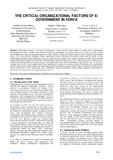| dc.description.abstract | eGovernment focusses on the use of technology to achieve levels of improvement in various areas of government,
transforming the nature of politics and relations between the government and citizens. However, in Kenya, just like in other
developing nations, many eGovernment projects have either stalled or failed to meet their objectives due to some key organizational
factors. This study therefore highlights critical organizational factors affecting eGovernment projects and the nature of their
relationships with eGovernment performance. The study employed cross-sectional survey design. Targeting the entire 18 eGovernment
projects implemented through the Information Communications Authority of Kenya since 2005. Both primary and secondary data was
collected and analyzed based on response from 217 respondents out of the 300 who participated (72% response rate). At the end, it
emerged that out of the various organizational factors hypothesized to predict eGovernment projects Performance, only organizational
structure, prioritization of deliverables, and organizational culture are critical in Kenyan context. Others identified in previous studies
such as future needs of the organization, power distribution, structure, information system strategy alignment, prioritization of
deliverables, and training were also important but not critical. | en_US |

